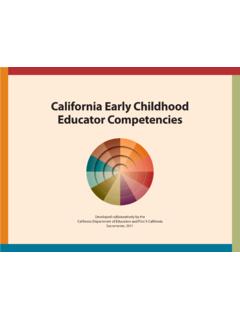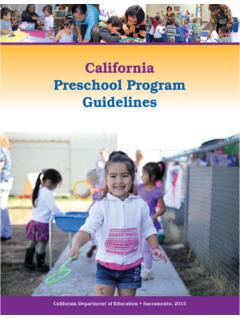Transcription of Texas Core Competencies for Early Childhood Practitioners …
1 Texas Core Competencies for Early Childhood Practitioners and AdministratorsThe Texas Core Competencies for Early Childhood Practitioners and Administrators were developed through a collaboration between the Texas Early Learning Council and the Texas Head Start State Collaboration Office, both housed at the Children s Learning Institute at The University of Texas Health Science Center at March 2013 Table of ContentsIntroduction 2 Acknowledgements 4 Overview 5 Using This Document 7 Core Competencies for Practitioners 10 Core Competency Area 1: Child Growth and Development 16 Core Competency Area 2: Responsive Interactions and Guidance 22 Core Competency Area 3.
2 Learning Environments, Planning Framework, Curriculum, and Standards 28 Core Competency Area 4: Supporting Skill Development 31 Core Competency Area 5: Observation and Assessment 43 Core Competency Area 6: Diversity and Dual Language Learners 47 Core Competency Area 7: Family and Community Relationships 50 Core Competency Area 8: Health, Safety, and Nutrition 54 Core Competency Area 9: Professionalism and Ethics 59 Core Competencies for Administrators 64 Core Competency Area 1: Establishing and Maintaining an Effective Organization 69 Core Competency Area 2: Business and Operations Management 72 Core Competency Area 3: Human Resource Leadership and Development 76 Core Competency Area 4: Maintaining a Healthy and Safe Environment 80 Core Competency Area 5: Implementing a Developmentally Appropriate Curriculum and Environment 84 Core Competency Area 6.
3 Instituting Family and Community-Centered Programming 89 Professional Development Resources 91 Glossary 92 References 95 Texas Core Competenciesfor Early ChildhoodPractitioners and Administrators2 Texas Core Competencies for Early Childhood Practitioners and AdministratorsIntroductionThe Texas Early Learning Council (TELC) and the Texas Head Start State Collaboration Office (THSSCO) collaborated to bring these Core Competencies to Texas . THSSCO houses the Texas Early Childhood Professional Development System (TECPDS), which was created to ensure that high quality professional development opportunities are available statewide to individuals working in Early care and education.
4 Since the Early 1990s, TECPDS has included Core Knowledge Areas for Practitioners , administrators, and trainers in its menu of services offered to the state. These statements have guided the training and professional development of thousands of Early care and education professionals in Texas , but they were in need of 2009, Governor Rick Perry appointed members to the Texas Early Learning Council, a federally-mandated council charged with improving school readiness in the state. In October 2010, the federal government made funds available to the Council to make improvements to the state s Early Childhood system, including major investments in the professional development system as part of the Council s improvement plan. A critical piece of the investment in our professional development system was to build on the Core Knowledge Areas, and produce new, detailed, voluntary Core Competencies for all Early Childhood professionals in the state.
5 TELC and THSSCO staff worked for over a year researching, drafting, and vetting these Core Competencies . Critical assistance was also provided by the Children s Learning Institute (CLI), as April Crawford, , a CLI researcher, served as the primary author of the Core Competencies . Dr. Crawford began the process by reviewing the preferences and notes of the TELC and the TECPDS Council. She then examined many existing state examples throughout the nation, consulted dozens of policy briefs, and reviewed the existing research literature on the subject. Her first drafts were reviewed by the TELC and TECPDS Council, as well as the TELC and THSSCO staff. The outcome of this iterative and stakeholder-driven process is Core Competencies for Early Childhood Practitioners and Administrators that are informed by research, as well as by a diverse group of Practitioners and stakeholders. The Core Competencies are important to the Early Childhood field of practice.
6 Demonstrating ability and excellence in any profession requires the mastery of different 3 Texas Core Competencies for Early Childhood Practitioners and Administratorscompetencies related to the job. For example, doctors must demonstrate their ability to diagnose and treat patients for all types of conditions, cashiers must demonstrate their skills in operating technology and interacting with customers, and computer programmers must demonstrate their knowledge of various programming languages and techniques. Early Childhood professionals are no different; there are concepts, practices, and knowledge they must know and be able to demonstrate in order to be be clear, core Competencies are defined as an individual s demonstrated skills and abilities. This document lists observable Competencies that, when accomplished, demonstrate competency in a particular area of knowledge. This document covers core Competencies for Early Childhood Practitioners and Core Competencies for Early Childhood Practitioners and AdministratorsAcknowledgementsThe efforts of many individuals contributed to the creation of this Adams, Texas Department of Family and Protective ServicesLaShonda Y.
7 Brown, Texas Head Start State Collaboration OfficeElsa Cardenas-Hagan, University of HoustonJudy Carnahan-Webb, Creative Trainers and ConsultantsAaron Carrara, Metropolitan Montessori SchoolsKatie Chennisi, Texas Head Start State Collaboration Office, Texas Early Childhood Professional Development SystemApril Crawford, Children s Learning InstituteDeborah Cody, Mount Pleasant Independent School DistrictSonya Coffey, Children s Learning InstituteSarah Crockett, Texas Association for Infant Mental HealthRegan Dobbs, Texas Workforce CommissionAna De Hoyos O Connor, San Antonio CollegeFrank Eckles, CYC Certification InstituteBlanca Enriquez, Education Service Center - Region 19 Head Start John W. Gasko, Children s Learning InstituteSue Hancock, Independent ConsultantTere Holmes, Children s Learning AdventureJennifer Lindley, Texas Early Learning CouncilRhonda Paver, Stepping Stone SchoolLee Roberts, Texas Department of Family and Protective ServicesElaine Shiver, Mental Health America of TexasDebbie Simpson-Smith, San Jacinto CollegeJackie Taylor, Texas Association for the Education of Young ChildrenDon Titcombe, Texas Early Learning CouncilKim Wedel, Texas Department of Assistive and Rehabilitative ServicesJudy Willgren, National Association of Child Care Resource and Referral Agencies5 OverviewStudies of Early learning programs have repeatedly demonstrated that Early Childhood classroom experiences can improve young children s academic and social skills trajectories upon school entry with many effects sustained through adolescence (Duncan, et al.)
8 , 2007; NICHD Early Child Care Research Network, 2005; Vandell, Belsky, Burchinal, Steinberg, & Vandergrift, 2010.) These benefits are closely linked with the quality of teacher-child interactions and instructional support children receive while in care ( Assel, Landry, Swank, & Gunnewig, 2007; Howes, et al., 2008; Mashburn, et al., 2008; Peisner-Feinberg, et al., 2001.) Unfortunately, numerous observational studies of Early care and education classroom experiences have demonstrated that typical child care quality is mediocre at best (NIHCD Early Child Care Research Network, 2006; Pianta & Hamre, 2009) and, for most children, does not reach threshold levels of quality associated with positive outcomes (Phillips & Lowenstein, 2011.) The majority of child care for infants and toddlers (86%) is characterized as mediocre to low quality (Helburn, 1995), often consisting of over-controlling care that is associated with increases in child cortisol levels as well as anxiety and aggression (Gunnar, Kryzer, Van Ryzin, & Phillips, 2010.
9 Evidence also shows that while the average pre-k classroom is characterized by moderate to high levels of sensitive emotional supports, instructional content is of rather low quality, particularly for children with low-income backgrounds (Burchinal, Vandergrift, Pianta, & Mashburn, 2010; Pianta, et al., 2005.) An important step toward enhancing children s outcomes is increasing the prevalence of high-quality teacher-child interactions in the classroom. Core Competencies for Early Childhood professionals clearly articulate the knowledge and skills that all types of Early Childhood Practitioners and administrators should possess in order to provide responsive, rich experiences. Competencies can play an instrumental role in the evaluation and improvement plans of local programs by helping decision-makers identify the strengths and professional development needs of their staff, and providing a structure for tracking program improvement. These Competencies also support change by guiding the development of high quality training and coursework that is grounded in evidence-based practices and adapted to the needs of learners with different levels of knowledge and mastery.
10 6 Texas Core Competencies for Early Childhood Practitioners and AdministratorsLevels of PracticeWithin core competency areas, levels of practice are described, progressing from beginner to advanced levels of knowledge and skills. For Practitioners , distinctions in levels of practice are connected to the following professional abilities: Articulating depth and breadth of knowledge Communicating effectively with staff and families Implementing lesson plans, routines, and curriculum Decision-making and leadershipFor administrators, distinctions in levels of practice are connected to the following professional abilities: Articulating depth and breadth of knowledge Communicating effectively with staff and families Implementing, supervising, and training Planning, decision-making, and leadershipThese leveled core Competencies can serve as the backbone for important system level changes including tracking training and professional development, establishing credentialing requirements, defining career lattice levels, and guiding the development of articulation agreements from 2-year to 4-year institutions of higher education (TELC working paper, 2012.)

